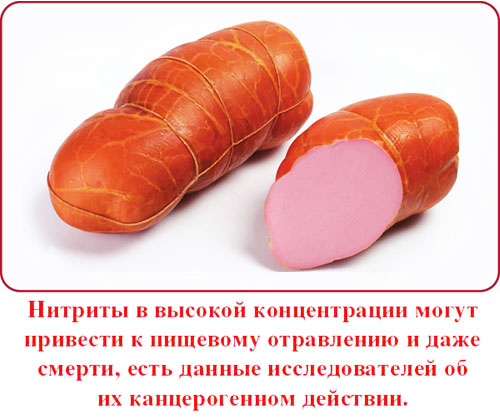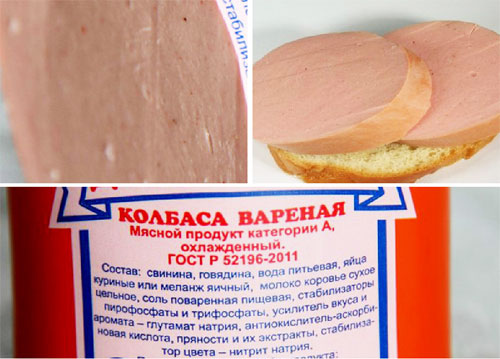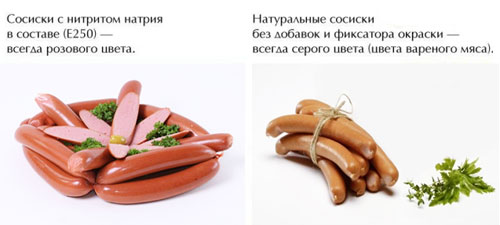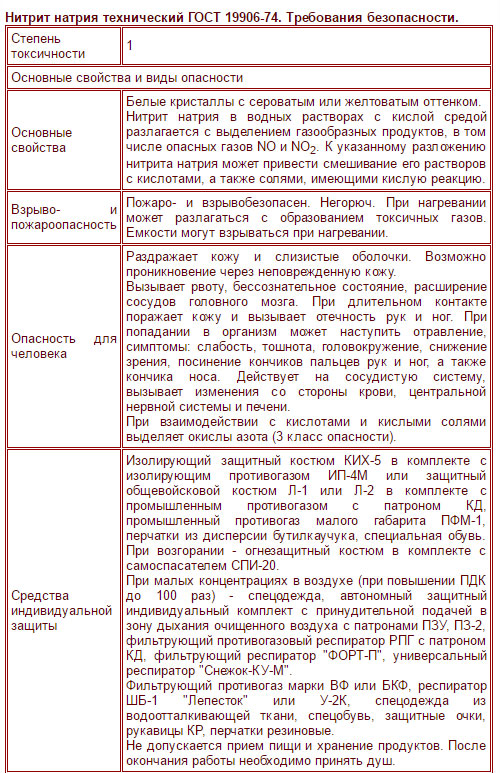Sodium salt of citric acid. Norms and dosages of sodium nitrite use. Sodium Nitrite Benefits
Referring to the group of antioxidants, food antioxidant E331 Sodium citrate or as it is also called citrate in the food industry, usually plays the role of an emulsifier or a stabilizer. By the way, in view of the fact that toxic and other negative properties of food antioxidant E331 Sodium citrates have not been identified, this additive is allowed for use throughout the world, including in EU countries, in Russia and in Ukraine.
Most observational studies on processed meat products and the results of their health attempt to correct the consumption of such products. However, these methods are not perfect. It is possible that the links are found between the processed meat and the disease. Usually, people who eat processed meat tend to act in relation to factors related to a less healthy lifestyle. However, sequential studies have strong links between processed meat consumption and various chronic diseases.
Summary: People who do not care about health tend to eat more processed meat. This may partly explain some of the associations found in research on consumable meat and possible diseases associated with diseases.
The appearance of edible antioxidant E331 Sodium citrate can be described as a white powder consisting of small crystals that have a sour-salty taste. This substance is excellent for long-term storage, it dissolves well in water, but is difficult to dissolve in alcohol-containing liquids. In addition, E331 is resistant to fire, therefore not capable of posing a threat as an explosive substance.
Processed meats are also associated with chronic diseases.
Consumption of processed meat is associated with an increased risk of many chronic diseases, among which.
- High blood pressure.
- Heart problem.
- Chronic lung disease.
- Intestines and stomach cancer.
For the first time, the properties of food antioxidant E331 Sodium citrate were discovered for a long time - back in 1914. It was then that Louis Egot (a learned physicist from Argentina), together with Belgian physician Albert Hastin, used sodium citrate as an anticoagulant during the blood transfusion procedure. Since then, E331 began to be actively used not only in medicine, but also in other areas of human life.
However, the evidence is convincing, because the links are strong and consistent. In addition, all supported by research conducted with animals. For example, studies with rats show that consuming processed meat increases the risk of developing bowel cancer. One thing is clear: the processed meat contains harmful chemical compounds that can increase the risk of chronic diseases. The most studied compounds are discussed below.
Summary: Consuming large amounts of processed meat over a long period can increase the risk of many chronic diseases, such as heart disease and cancer. They are formed from nitrite, which is added to processed meat products.
Thus, the spectrum of use of sodium citrate can be called a fairly wide. For example, in the food industry, food antioxidant E331 Sodium citrate is added during the production of beverages (especially those that need to give a taste of citrus), souffles, jellies, pastila, marmalade, yogurts, processed cheese, as well as milk powder and infant formula. In addition, sodium citrate itself is often used as a seasoning.
Sodium nitrite is used as an additive for three reasons. Nitrite and related compounds, such as nitrates, are also found in other products. For example, nitrate is found at relatively high levels in some vegetables and may even be beneficial to health. However, not all nitrites are the same. Processed meat is the main source of nutrition for nitrosamines.
Other sources include polluted water, tobacco smoke and canned salted foods. Nitrosamines are mainly produced when processed meat products are exposed to high temperatures, such as fried bacon or fried sausages. Animal studies suggest that nitrosamines may play an important role in the development of bowel cancer. This is confirmed by observational studies with humans, indicating that nitrosamines may increase the risk of cancer.
The benefits of food antioxidant E331 Sodium citrates
Due to the fact that this substance is involved in many processes that occur in the human body, the benefits of food antioxidant E331 sodium citrate is obvious. First of all, E331 helps to treat such diseases as cystitis and some other infectious diseases of the genitourinary system. Sodium citrate is also used as a laxative.
Polycyclic aromatic hydrocarbons
Processed, fried, or roasted meats may contain several relative levels of nitrosamines. Studies show that these compounds increase the risk of cancer in the stomach and intestines. Smoked meat is one of the oldest methods of preservation, often used in combination with salted or dry. This leads to the formation of several potentially hazardous substances called polycyclic aromatic hydrocarbons. They represent a great class of substances formed during the combustion of organic matter and leaves in the form of smoke and accumulate on the surface of smoked meat products, which is barbecue, fried or fried in fire.
This supplement has found wide application in donation - thanks to it, the blood does not clot for a long time. And the use of food antioxidant E331 Sodium citrate is expressed in the ability to lower the acidity and, accordingly, to remove heartburn, hangover.
Safe for life, the daily rate of human consumption of sodium citrate is not yet known. Meanwhile, the dietary supplement E331 is recognized to be safe for human life and health, as there are no facts confirming its detrimental effect on the body.
They can be formed from.
- Firewood or charcoal.
- Dripping fat that burns on a hot surface.
- Meat burned or charred.
Abstract: Smoked meat products may contain large amounts of polycyclic aromatic hydrocarbons. These compounds can cause cancer. Heterocyclic amines are a class of chemical compounds that are formed when cooking meat or fish at high temperatures, for example, during frying or cooking. Amines are not limited in processed meat, but can be found in significant quantities, especially in sausages, fried bacon and hamburgers. It can cause cancer if given in large quantities in animals.
If you like the information, please click
Sodium nitrite, also known as E250, is a food additive that acts as a preservative and a color fixative for food production. Chemical formula NNaO 2.
In general, these high quantities are much higher than usual when they are contained in a person’s diet. However, countless observational studies conducted with people indicate that eating good meat can increase the risk of developing colon, breast and prostate cancer. This effect can be used with soft cooking methods, such as frying at low temperature and steam.
Some processed meat products may contain heterocyclic amines, carcinogenic compounds are also found in meat and fish in a very late period. Processed meat products are usually loaded into sodium chloride, also known as common salt. For thousands of years, salt has been added to food as a preservative. However, it is most often used to improve taste. Although processed meat is far from the only food rich in salt, it can significantly increase the salt level of many people.
Sodium nitrite is a salt of nitrous acid, obtained from oxides as a result of chemical reactions. Sodium nitrite usually looks like white and slightly yellowish powder or small crystals, it does not smell, it tastes a little sour (calorizator). It has good hygroscopicity and quickly dissolves in water.
Sodium Nitrite Benefits
Sodium nitrite has the properties of a strong antibiotic that can destroy the causative agents of many dangerous diseases, for example, botulism.
Excessive salt intake can play a role in hypertension and heart disease, especially for those who have a condition called salt-sensitive hypertension. In addition, several observational studies show that diets rich in salt may increase the risk of developing stomach cancer.
This view confirms that a salt-rich diet can increase the growth of bacteria that cause ulcers in the stomach, which is a significant risk factor for stomach cancer. A little salt for whole foods is good for improving taste, but consuming processed foods in large quantities can cause damage.
Sodium Nitrite Harm
Sodium nitrite is recognized as a common remedy, including for mammals (50% of rats die at a dose of 180 milligrams per kilogram of weight), which is highly toxic and carcinogenic, with an overdose of a substance, serious poisoning occurs, often fatal.
The use of sodium nitrite can cause a decrease in muscle tone and a sharp decrease in pressure. The studies revealed the formation of the N-nitrosamine carcinogen by the reaction of sodium nitrite with amino acids when they are heated, which means the potential for the formation of cancer changes when using products that have undergone heat treatment in the presence of sodium nitrite.
Summary: Processed meat products contain large amounts of salt, which can contribute to the emergence of some health problems. Processed meat contains several chemical compounds that, naturally, are not present in fresh meat. Many of these compounds are harmful to health. For this reason, consuming large quantities of processed meat over time may increase the risk of chronic diseases, especially cancer. However, eating them sometimes doesn't hurt. Just make sure not to let them dominate your diet and avoid eating every day.

Recent studies have found a link between the use of similar products and intestinal cancer. There was also a link between the frequent consumption of meat with nitrite and chronic obstructive pulmonary disease.
In its natural environment, fresh meat acquires a gray color in a few hours, due to reaction with air. To avoid the unappetizing gray tint in meat and sausage products, the food industry makes extensive use of the E250 additive, which is a fixative of color.
Finally, you must limit food intake and base your diet on fresh foods. Our main focus is to get along with it the medicines that we take to “cure” the diseases caused by these chemical additives, which are placed in our food, to preserve it, to keep an attractive appearance, I like “to do in place "Rather artificially, and mask the aromas, smells and colors. We will present the chemical ingredients used in human consumption products, such as industrial products, cosmetics, sunscreens, shampoos, among others, dissolving one by one, about possible toxicity and potential damage to human health.

Therefore, almost all meat and sausage products owe the pink color to E250. But sodium nitrite affects not only the coloring of the products, but also is the so-called antibacterial agentthat protects products from the growth of bacteria and microbes.

We will rely on research with sources that will be properly presented. Thus, the reader can, with due knowledge of each component, verify that the product he buys is a carrier or not of the ingredients presented here, being aware of his potential health risks and in what aspects, more precisely. This is a very effective and cheap degreaser. Products containing these substances can affect those prone to eczema and other irritations.
This substance helps with high foam production in these products, which makes it possible to better distribute the product during the washing of hair, skin or teeth. When rinsing, the product will wash the area, but, on the other hand, will also remove moisture from the upper layers of the dermis. In people with sensitive skin, the hydrophilic properties of this type of detergent can cause renewed skin problems or worsen existing conditions. Products with the best raw materials make much less foam, as well as liquid soap made from natural products.
Application of E250 in other industries
Sodium nitrite is used not only in the food industry, but also:
- In medicine, the vasodilating property of sodium nitrite is used, it is used as a laxative and bronchodilator, it neutralizes intestinal spasms and acts as an antidote for cyanide poisoning,
- In construction - as an antifrosty additive to concrete,
- In the textile industry - in dyeing fibers,
- In the photo - as an antioxidant and reagent,
- In the production of rubber and dyes.

The Environmental Protection Agency considers 1, 4-dioxane as a possible carcinogen. There are also concerns about ethylene oxide pollution. Nitrogen compounds are abundant in nature and are involved in most biological processes. Nitrates and nitrites are present in soil, water, and various types of food. In vegetables, they are naturally one of the sources of nitrogen needed for growth. In recent years, several studies have shown that nitrates and nitrites present in food can be considered potentially dangerous.
Rates and dosages of sodium nitrite use
Standards when using sodium nitrite are strict, must be strictly followed. In the European Union E250 is allowed to use only as an additive to and not more than 0.6%. In the case of an increase in permissible dosage, sodium nitrite can cause significant harm to the human body.
Use of E250 in Russia
On the territory of Russia and Ukraine there is a list of additives that are allowed for use. E250 Sodium Nitrite is included in this list, subject to the prescribed dosages.
These studies relate to the participation of these ions with secondary amines in the formation of certain types of carcinogenic nitrosamines. The levels of nitrate and nitrite in food are regulated. In Brazil, cancer is the second cause of death among women, and the third among men, according to data released by the Ministry of Health, in these alarming figures, second scientists and doctors, is the result of various environmental factors associated with the industrialization process, such as chemical, physical and biological agents; and living conditions, which differ in intensity due to social inequality.
Similar properties and has a food additive. Sodium nitrite corresponds to GOST 4197-74 or TU 6-09-590-75 (grade OCh 4-7-3). Sodium nitrite in powder form according to GOST 19906-74 or an aqueous solution is used as an antifreeze additive to concrete in the manufacture of building products and structures, as an inhibitor of atmospheric corrosion, in organic synthesis, and for other purposes in chemical, metallurgical, medical, pulp and paper and other industries.
